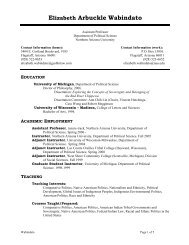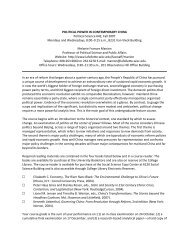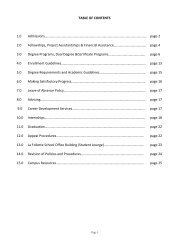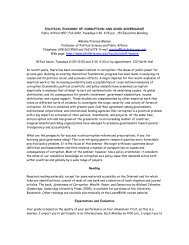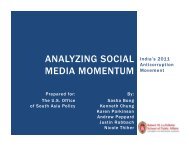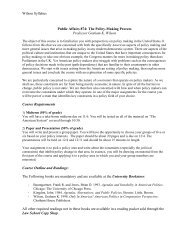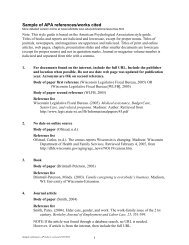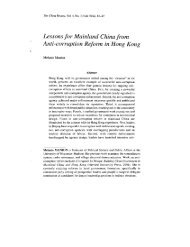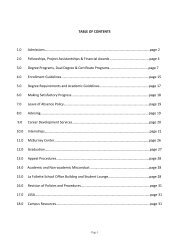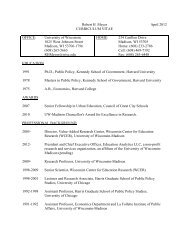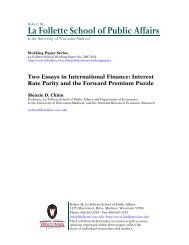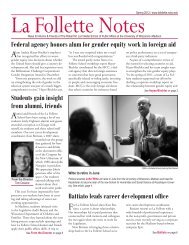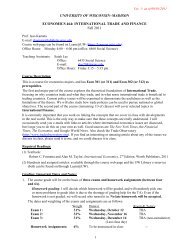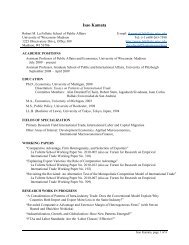SAVE Commission's findings - La Follette School of Public Affairs ...
SAVE Commission's findings - La Follette School of Public Affairs ...
SAVE Commission's findings - La Follette School of Public Affairs ...
Create successful ePaper yourself
Turn your PDF publications into a flip-book with our unique Google optimized e-Paper software.
21.13<br />
21.14<br />
21.15<br />
21.16<br />
21.17<br />
21.18<br />
Promote regulatory innovation. To achieve<br />
greater cost effectiveness and use <strong>of</strong> technology,<br />
agencies and local governments should<br />
annually share their regulatory innovations,<br />
consistent with the Wisconsin Idea.<br />
Promote pr<strong>of</strong>essional development. To keep<br />
staff current with technical trends, agencies<br />
should do a better job <strong>of</strong> staff training and pr<strong>of</strong>essional<br />
development.<br />
Facilitate regulatory coordination and reorganization.<br />
To better address the world as it<br />
exists, agencies should be less turf protective<br />
and set up mechanisms developed within<br />
agencies and between agencies to facilitate integration<br />
and cooperation. The initiative<br />
should have carrots and sticks, as the private<br />
sector complained vigorously about lack <strong>of</strong><br />
intra- and interagency coordination and turf<br />
protection.<br />
Create an integrated permitting system. To<br />
provide better service to businesses, landowners<br />
and local governments, consider creating<br />
an integrated permitting system that will provide<br />
those who need permits “one stop shopping,”<br />
either through the information superhighway<br />
or in walk-in state and local government<br />
permit centers, such as the consolidated<br />
job centers that already exist.<br />
Consolidate agency field <strong>of</strong>fices and train personnel.<br />
To provide uniform and informed answers<br />
and decisions to local governments, businesses<br />
and citizens, state agencies should consider<br />
consolidating <strong>of</strong>fices and enhance training<br />
<strong>of</strong> field staffs. Other means to provide uniform<br />
service might be through the information<br />
superhighway.<br />
Create an electronic system for rule development<br />
and administration. To eliminate considerable<br />
waste, transform the rule process to<br />
electronic by the 2001 biennium. Implementation<br />
should accomplish greater public input<br />
and processing efficiency. Rules’ electronic<br />
homes should eventually include digitized visual<br />
and adjudication guidance to inform the<br />
regulated, the Legislature, the bureaucrats and<br />
enforcement personnel.<br />
21.19<br />
Use environmental auditing as a tool to prevent<br />
problems. To develop a more preventive<br />
and user friendly approach to environmental<br />
protection, the state should transfer regulatory<br />
energy from focusing on detailed form processing<br />
to facilitating comprehensive environmental<br />
audits for businesses and governments.<br />
Audits would generally result in corrective, not<br />
enforcement action.<br />
GOAL #22: JUDICIAL BRANCH<br />
22.1<br />
Courts should plan for the future as do other<br />
branches <strong>of</strong> government. To better plan for<br />
the future, the court system should look to<br />
future needs, have a vision and plan what the<br />
system should look like in the next century.<br />
The planning process should involve more<br />
than just “<strong>of</strong>ficers <strong>of</strong> the court,” however, and<br />
meaningfully involve the people as equals.<br />
22.2<br />
The court system should embrace technology<br />
for efficiency and service. To achieve significant<br />
savings, the courts and the entire law enforcement<br />
system should become electronic<br />
in function and culture. In doing so, the legal<br />
pr<strong>of</strong>ession should initiate a cleansing <strong>of</strong> statutes<br />
and procedures predicated upon outdated<br />
procedural practices that have little to do with<br />
justice in a high-tech age.<br />
22.3<br />
Address artificial barriers that discourage efficiency.<br />
To end the same inefficient, turf-protective<br />
practices that affect other branches, the<br />
courts should conduct an examination <strong>of</strong> the<br />
management, financial and jurisdictional system<br />
and make recommendations <strong>of</strong> consequence.<br />
Failing that, the Legislature should do<br />
it.<br />
22.4<br />
Examine the concept <strong>of</strong> responsibilities with<br />
rights. To give balance in a system focused on<br />
rights over responsibilities, the legal pr<strong>of</strong>ession,<br />
a defender <strong>of</strong> rights, should lead a dialogue on<br />
community rights that incur individual responsibilities.<br />
This dialogue might be in tandem<br />
with the discussion about a Bill <strong>of</strong> Responsibilities<br />
(see Preamble). The dialogue also may<br />
involve the question, as applied to Wisconsin,<br />
whether the law is replacing morality as guiding<br />
behavior.<br />
72 CITIZEN • COMMUNITY • GOVERNMENT — WISCONSIN: THE 21 ST CENTURY



